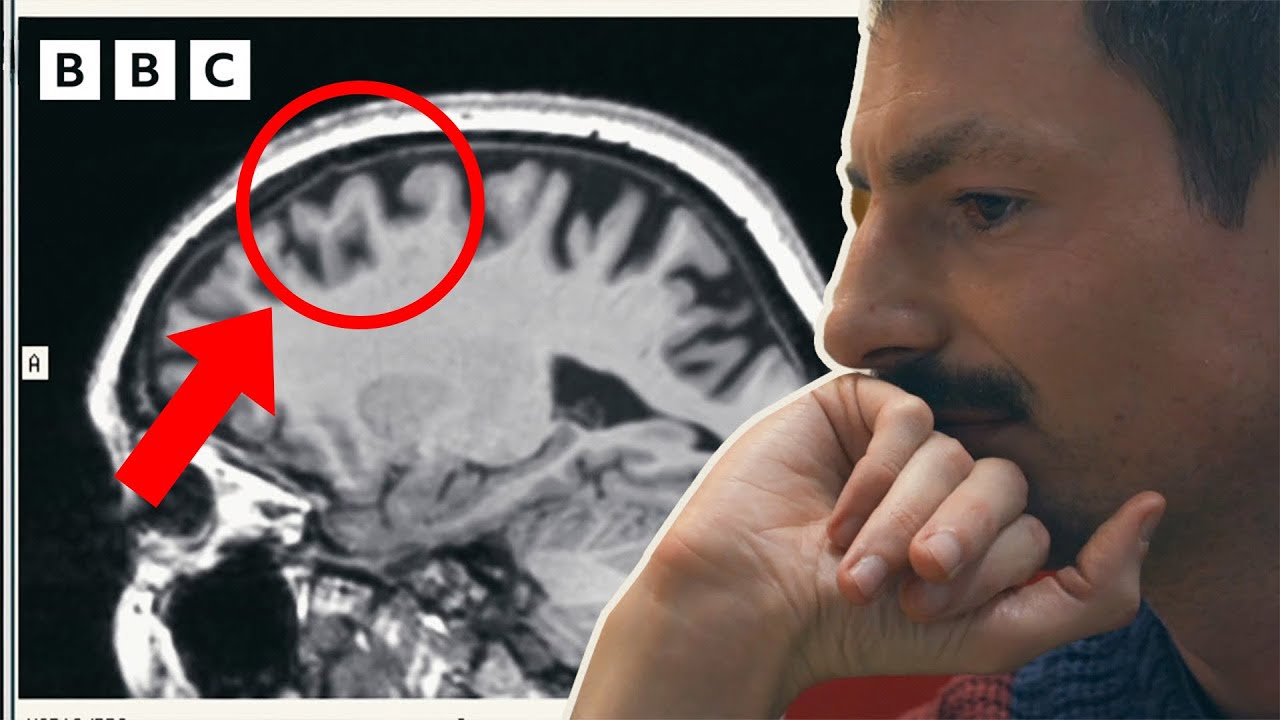Son sees how Alzheimer’s affected his mum’s brain – BBC
now this is 2002 2003 6 7 and so on and only because you can compare it to an earlier one do you start seeing well look there there might be a little bit more space there yeah probably that’s the latest one where we we thought potentially it could just be something else but we were raising concerns in the hope that it wasn’t and now if we just move on 2010 all the way through 2016 can you see these spaces opening up the black areas these black areas um is that just space is that just fluid that’s fluid or fluid that’s replaced where there was brain tissue that’s and that’s 2016 that’s 2016 between maybe this scan and this scan we started raising concerns about the way that she was behaving not remembering things not wanting to engag so much not not initiating conversations and that sort of thing and this kind of explains it a bit doesn’t it you see this is the year that I got married but now if we um show you that whole series so you can see the change and that’s that’s what the disease does it’s devastating all the cognitive functions calculation language Visos spatial planning skills that make us what we are as a thinking human all being affected
In this incredibly moving clip, John sees the affects of Alzheimer’s on his mum’s brain throughout the years after she developed it at just 54 years old.
#TheJenningsVsAlzheimers #iPlayer
Subscribe and 🔔 to the BBC 👉 https://bit.ly/BBCYouTubeSub
Watch the BBC first on iPlayer 👉 https://bbc.in/iPlayer-Home
When a mutant gene causing Alzheimer’s is discovered in the Jennings family, it leads scientists on a journey to develop a cure and leaves family members with a terrible dilemma. #TheJenningsFamilyvsAlzheimers #iPlayer
All our TV channels and S4C are available to watch live through BBC iPlayer, although some programmes may not be available to stream online due to rights. If you would like to read more on what types of programmes are available to watch live, check the ‘Are all programmes that are broadcast available on BBC iPlayer?’ FAQ 👉 https://bbc.in/2m8ks6v.

21 comments
No proofreaders at the BBC?
IT'S SAD THAT THEY COULD DO NOTHING TO STOP IT😢
This is America the land of making money if peoples death and not curing them. They only see walking piggy banks
Alzheimer’s destroyed my grandma and my mom. Mom got her diagnosis at 77. I’m 63. I’ve got a little time left but not much. I’m proud I didn’t have kids so I didn’t pass it on. I chose not to pass it on.
Sad….😢
Heartbreaking 😢
My mom had Dementia. It took her over in a year. She passed February 2024.
I once knew a very prominent attorney who was irate because he did not get Alzheimer's. He said he hated the secrets he kept
Twenty four years ago, at the age of 40-ish, I began to have serious memory issues. An MRI clearly showed that I had already had significant brain atrophy. My MRI looked very, very similar to this woman's, with CSF where brain matter should have been. My longtime neurologist sent me to a professor of neurology who was at the forefront of memory loss and Alzheimers research and treatment. His tests didn't confirm Alzheimers, and it didn't confirm any other conditions, either.
FF to 2012. I left my abusive husband. In late 2013, I had another MRI of my brain.
My brain had filled in!! There were no empty spaces filled by CSF!! It appeared to have regrown. Memory issues were minimal by then, and were well within the parameters of my age.
I happened to come across a neurology publication that mentioned that the brain can atrophy after just a few years into an abusive relationship! I'd spent 32 years with my husband.
That my brain had "regrown" was a miracle!! It's worth it for physicians to look beyond physical factors and to look into the emotional and mental factors as well. Ask patients if they are being mistreated, abused, and/or if their lives are uncommonly stressful. This could hold at least one of the causes of memory problems.
very sad
My mother was one of 5 sisters. Out of the 5 3 including my mom got Alzheimers. The worst for me was her not knowing who I was. Such a horrible disease. Hopefully one day a cure will be found
How is it possible that the appalling gramar in the title was posted by the BBC?
I'm so sorry for all those directly affected (& otherwise) by this awful disease. 😢
Now sad 😢
It seems like it's being used as an unscientific way to make money even more so than with mad cow disease.
I guess the number of cruel Chimi Mouryou has increased.
Se fosse minha mãe gostaria de dizer a ela que a vida que se foi não pode ser esquicida…não a conheci mas sei com toda certeza que ela se lembra de momentos bons
I’m so so sorry Daddy.
Jesus is the way the truth and the life. Praying shes in heaven ❤
Good morning. If you are looking for the reason why. I'v the explanation (by theory of prion)and you are subject to
Such an awful disease.
Poignant. Mum died in December after 10years with Alzheimer's. Such a hard disease for the whole family. Really helps to understand the reality of how the disease affects the brain